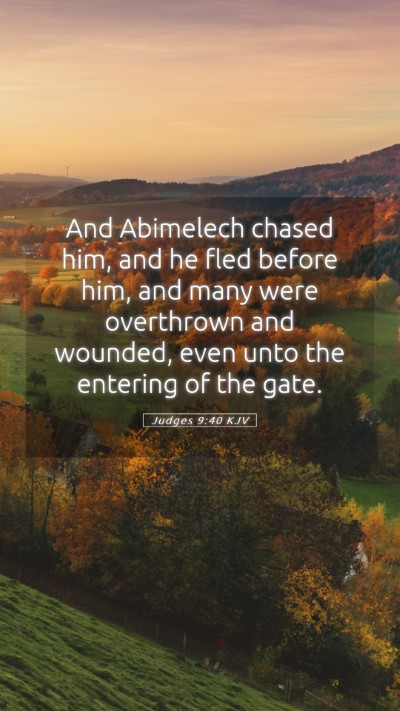Understanding Judges 9:40
Judges 9:40 states: "And Abimelech chased him, and he fled before him; and many were overthrown, and wounded, and they fell down dead." This verse captures a critical moment in the narrative of Abimelech's reign and his ruthless pursuit of power. Below, we explore the meanings and implications of this verse through the lens of public domain commentaries.
Bible Verse Meanings and Interpretations
The verse presents an intense conflict, emphasizing the consequences of ambition and strife. Abimelech's actions reflect a violent quest for authority, demonstrating how moral corruption can lead to devastation. The public domain commentaries provide various insights into this text, which collectively enhance our understanding of Scripture.
Insights from Matthew Henry
- Context of Abimelech: Matthew Henry highlights Abimelech’s desire to consolidate his power after killing his brothers. This aggressive mindset sets the stage for the ensuing violence.
- Symbol of Conflict: The pursuit of those who fled indicates the broader conflict within Israel at that time. Henry suggests this represents the struggles between rightful leaders and those who seek to seize power through treachery.
- Moral Lessons: This episode serves as a cautionary tale about the lengths to which individuals will go to achieve their ambitions at the expense of others.
Insights from Albert Barnes
- Historical Context: Barnes provides a detailed backdrop of the historical events, explaining that Abimelech's ruthless actions symbolize the chaos and disorder prevalent in Israel following the death of Gideon.
- Consequence of Actions: He emphasizes that the violent actions of Abimelech ultimately led to his downfall, reinforcing the biblical principle that those who live by the sword will die by the sword.
- Faith and Leadership: Barnes contrasts Abimelech's leadership with the qualities of biblical leadership that are rooted in righteousness and justice.
Insights from Adam Clarke
- Commentary on Suffering: Clarke points out that the fleeing individuals represent not just victims of violence but also the larger societal implications of such chaos.
- Application of the Law: Adam Clarke notes the importance of divine justice and retribution as part of the narrative, suggesting that Abimelech's violent actions will incur God’s judgment.
- Spiritual Reflection: He urges readers to reflect on the spiritual ramifications of following a leader like Abimelech, as it represents a rejection of God’s intended order.
Significance of Judges 9:40 in Biblical Context
This verse serves as a pivotal moment, encapsulating themes of ambition, betrayal, and divine justice. The narrative underscores the consequences of pursuing power outside of God’s will.
Biblical Cross References
- 1 Samuel 15:23: “For rebellion is as the sin of witchcraft, and stubbornness is as iniquity and idolatry.”
- Proverbs 16:18: “Pride goes before destruction, and a haughty spirit before a fall.”
- Galatians 6:7: “Do not be deceived: God is not mocked, for whatever one sows, that will he also reap.”
Through this reflective analysis, students of the Bible can gain better Bible study insights, allowing for a deeper examination of individual characters and their respective choices. Whether participating in Bible study groups or utilizing online Bible study tools, this in-depth examination of Judges 9:40 encourages believers to explore the meaning of Bible verses as they relate to personal faith journeys.
Understanding difficult Bible passages such as this one opens the door for more profound spiritual growth and biblical exegesis. In essence, this analysis provides a platform for exploring Bible study lessons that remain relevant today, reminding us of the eternal truths encapsulated within the Scriptures.


